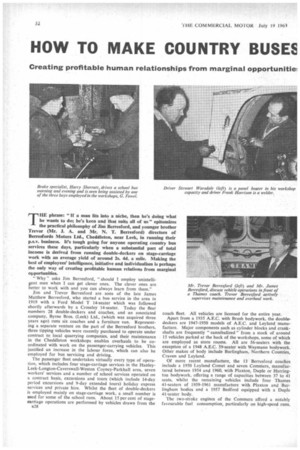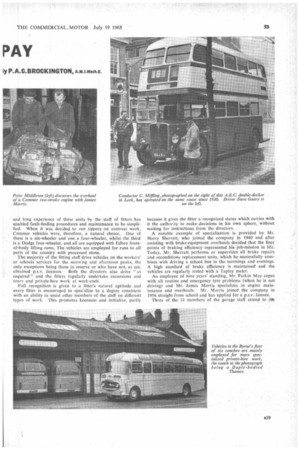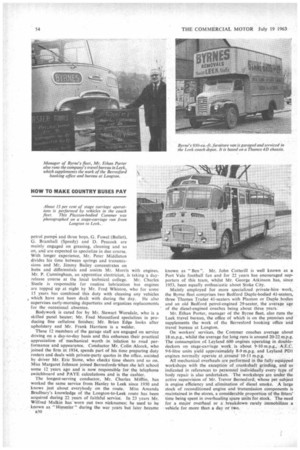HOW TO MAKE COUNTRY BUSES PAY
Page 54

Page 55

Page 56

If you've noticed an error in this article please click here to report it so we can fix it.
HE phrase: "if a man fits into a niche, then he's doing what
T,
he wants to do; he's keen and that suits all of us" epitomizes the practical philosophy of Jim Berresford, and younger brother Trevor (Mr. J. A. and Mr. N. T. Berresford) directors of Berresfords Motors Ltd., Cheddleton, near Leek, in running their p.s.v. business. It's tough going for anyone operating country bus services these days, particularly when a substantial part of total income is derived from running double-deckers on stage-carriage work with an average yield of around is. 44. a mile. Making the best of employees' intelligence, initiative and individualism is perhaps the only way of creating profitable human relations from marginal opportunities.
" Why " asks Jim Berresford, "should I employ unintelligent men when I can get clever ones. The clever ones are better to work with and you can always learn from them."
Jim and Trevor Berresford are sons of the late James Matthew Berresford, who started a bus service in the area in 1919 with a Ford Model T 14-seater which was followed shortly afterwards by a Crossley 14-seater. Today the fleet numbers 28 double-deckers and coaches, and an associated company, Byrne Bros. (Leek) Ltd., (which was acquired three years ago) runs six coaches and a furniture van. Representing a separate venture on the part of the Berresford brothers, three tipping vehicles were recently purchased to operate under contract to local quarrying companies, and their maintenance in the Cheddleton workshops enables overhauls to be coordinated with work on the passenger-carrying vehicles. This justified an increase in the labour force, which can also be employed for bus servicing and driving.
The passenger fleet undertakes virtually every type of operation, which includes four stage-carriage services in the HanleyLeek-Longton-Caverswall-Weston Coyney-Parkhall area, seven workers' services and a number of school services operated on a contract basis, excursions and tours (which include 14-day period excursions and 9-day extended tours) holiday express services and private hire. Whilst the fleet of double-deckers is employed mainly on stage-carriage work, a small number is used for some of the school runs. About 15 per cent of stagecarriage operations are performed by vehicles drawn from the B28 coach fleet. All vehicles are licensed for the entire year.
Apart from a 1935 A.E.C. with Brush bodywork, the doubledeckers are 1947-1950 models of A.E.C. and Leyland manufacture. Major components such as cylinder blocks and crankshafts are frequently " cannibalized " from a stock of around 15 vehicles parked at the back of the workshops, some of which are employed as store rooms. All are 56-seaters with the exception of a 1948 A.E.C. 59-seater with Weymann bodywork. Other makes of body include Burlingham, Northern Counties, Craven and Leyland.
Of more recent manufacture, the 13 Berresford coaches include a 1950 Leyland Comet and seven Commers, manufactured between 1954 and 1960, with Plaxton, Duple or Harrington bodywork, offering a range of capacities between 37 to 41 seats, whilst the remaining vehicles include four Thames 41-seaters of 1959-1961 manufacture with Plaxton and Burlingham bodies and a 1957 Bedford equipped with a Duple 41-seater body.
The two-stroke engines of the Commers afford a notably favourable fuel consumption, particularly on high-speed runs,
and long experience of these units by the staff of fitters has enabled fault-finding procedures and maintenance to be simplified. When it was decided to run tippers on contract work, Commer vehicles were, therefore, a natural. choice. One of these is a six-wheeler and one a four-wheeler, whilst the third is a Dodge four-wheeler, and all are equipped with Edbro frontof-body lifting rams. The vehicles are employed for runs to all parts of the country with processed stone.
The majority of the fitting staff drive vehicles on the workers' or schools services for the morn:ng and afternoon peaks, the only exceptions being those in reserve or who have not, as yet, obtained •p.s.v. licences. Both the directors also drive " as required" and the fitters regularly undertake excursions and tours and private-hire work at week-ends.
Full recognition is given to a fitter's natural aptitude and every fitter is encouraged to spec:alize to a degree consistent with an ability to assist other members of the staff on different types of work. This promotes keenness and initiative, partly
because it gives the fitter a recognized status which carries with it the authority to make \decisions in his own sphere, without waiting for instructions from the directors.
A notable example of specialization is provided by Mr. Harry Sherratt, who joined the -company in 1940 and after assisting with brake-equipment overhauls decided that the finer points of braking efficiency represented his job-mission in life. Today, Mr. Sherratt performs or supervizes all brake repairs and reconditions replacement units, which he successfully combines with driving a school bus its the mornings and evenings. A high standard of brake efficiency is maintainedand the vehicles are regularly tested with a Tapley meter.
,An employee of nine years' standing, Mr. Parkin May copes with all routine and emergency tyre problems (when he is not driving) and Mr. James Morris specializes in engine maintenance and overhauls. Mr. Morris joined the company in 1956 straight from school and has applied for a p.s.v. licence.
Three of the 21 members of the garage Staff attend to tht petrol pumps and three boys, G. Fowel (Bullet), G. Bramhall (Speedy) and D. Peacock are mainly engaged on greasing, cleaning and so on, and are expected to specialize in due course. With longer experience. Mr. Peter Middleton divides his time between springs and transmissions and Mr. Jimmy Bailey concentrates on hubs and differentials and assists Mr. Morris with engines. Mr. P. Cunningham, an apprentice electrician, is taking a dayrelease course at the local technical college. Mr. Charles Steele is responsible for routine lubrication but engines are topped up at night by Mr. Fred Whiston, who for some 15 years has combined this duty with cleaning any vehicles which have not been dealt with during the day. He also supervises early-morning departures and organizes replacements for the occasional absentee.
Bodywork is cared for by Mr. Stewart Worsdale, who is a skilled panel beater; Mr. Fred Mountford specializes in producing fine cellulose finishes; Mr. Brian Edge looks after upholstery and Mr. Frank Harrison is a welder.
These 12 members of the garage staff are engaged on service driving on a day-to-day basis and this enhances their practical appreciation of mechanical worth in relation to road performance and appearance. Conductor Mr. Colin Alcock, who joined the firm in 1934, spends part of his time preparing duty rosters and deals with private-party quotes in the office, assisted by driver Mr. Eric Stone, who checks time sheets and so on. Miss Margaret Johnson joined Berresfords-When she left school some 12 years ago and is now responsible for the telephone switchboard and PAYE calculations and is the cashier.
The longest-serving conductor, Mr. Charles Mifflin, has worked the same service from Hanley to Leek since 1930 and knows just about everybody on the route. Miss Amanda Bradbury's knowledge of the Longton-to-Leek route has been acquired during 22 years of faithful service. In 23 years Mr. Wilfred Malkin has worn out two nicknames; he used to be known as " Flimmler " during the war years but later became B30 known as " Ben ". Mr. John Cotterill is well known as a Port Vale football fan and for 22 years has encouraged supporters of this team, whilst Mr. George Atkinson has, since 1953, been equally enthusiastic about Stoke City.
Mainly employed for more specialized private-hire work, the Byrne fleet comprises two Bedford Duple-bodied 4I-seaters, three Thames Trader 41-seaters with Plaxton or Duple bodies and an old Bedford petrol-engined 29-seater, the average age of the diesel-engined coaches being about three years.
Mr. Ethan Porter, manager of the Byrne fleet, also runs the Leek travel bureau, the office of which is on the premises and supplements the work of the Berresford booking office and travel bureau at Longton.
On workers' services, the Commer coaches average about 18 m.p.g„ whilst the average for long runs is around 20-22 m.p.g. The consumption of Leyland 600 engines operating in doubledeckers on stage-carriage work is about 9-10 m.p.g., A.E.C. 9.6-litre units yield approximately 8-9 m.p.g. and Leyland PDI engines normally operate at around 10-11 m.p.g.
All mechanical overhauls are performed in the fully equipped workshops with the exception of crankshaft grinding, and as indicated in references to personnel individually every type of body repair is also undertaken. The workshops are under the active supervision of Mr. Trevor Berresford, whose pet subject is engine efficiency and elimination of diesel smoke. A large stock of reconditioned engine and transmission components is maintained in the stores, a considerable proportion of the fitters' time being spent in overhauling spare units for stock. The need for a major overhaul or a breakdown rarely immobilizes a vehicle for more than a day or two.




















































































































